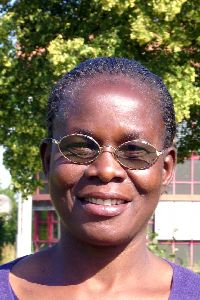Rebecca Osiro

WOMEN’S VIEWS ON THE ROLE OF KADHI COURTS:
A CASE STUDY OF KENDU BAY, KENYA
Since independence in 1963, the Kenyan Constitution has gone through numerous amendments including sections of the Kadhi Courts Act, to an extent that a total overhaul was inevitable. The clamour for constitutional review intensified after the general elections of 1992 when the political parties realized that it was the key to free and fair elections. However, contentious issues soon emerged in the drafting process, Kadhi Courts being one of them. The debate centred on whether or not Kadhi courts should be entrenched into the constitution. The proponents for the enactment of the courts expressed their fear that if left out of the draft constitution, Kadhi Courts could easily be legislated against by an Act of Parliament. Alternatively the opponents based their arguments against the entrenchment, on the perceived precedence of Islam over other religions. They also argued on the implication in the constitution that Kenya was a secular state and therefore laws that pertained to religion should not prevail.
Kendu Bay is a small town on the southern shores of Lake Victoria in western Kenya. It is about one hundred and twenty kilometres south of Kisumu, the headquarters of Nyanza Province. The progenitors of Islam in the district were an Arab trader who settled there around 1904 and his Gwe counterpart who was the first convert. Today, the Muslim community in Kendu Bay comprise of the Luo, Gwe and a mixture of groups popularly referred to as ‘Waswahili’. The identity was influenced by movements between the Muslims in Kendu Bay and Kenya’s coastal towns that informed the context for example, the life style and Swahili as the lingua franca.
The research work focuses on the views of Muslim women from Kendu Bay on Kadhi Courts. Being in the interior of Kenya and with a long history of Muslim settlement, Kendu Bay is a viable area for the research, taking into account that earlier research has concentrated mainly on the coastal regions. The Muslims in Kendu Bay are rarely heard on issues of national importance. As a group within a minority community in the country, the Muslim women are faced with a dual subjugation. The study, of a microcosm, aims at giving them a voice in the academic arena so that their views on the legal unit established to guard their personal issues can be heard.
The first phase of the research work has been conducted with eleven women and two male experts through narrative interviews and participation in one Kadhi Court proceeding in Kisumu. The informants were drawn from different ethnic and religious backgrounds, educational level, social and economic status and of varied ages. The experts were interviewed with the view to having them offer the normative position of the Muslim Family Law which is the basis upon which Kadhisfunctioned. The research focused on issues of marriage (its contraction), nafaqah (maintenance in marriage), talaq (divorce) and its consequences, reconciliation and re-marriage, widowhood and succession.
Preliminary findings have indicated divergence from the normative. Since most Muslim men married women from non-Muslim (Christian) backgrounds, nikah (wedding) was attached to conversion without prior teaching, a process that contributed to the women’s ignorance of the basic roles and rights that Islam accorded them as women. However, more often than not, the context determined the status quo for even the few informants who were born and married in Muslim families did not abide by the rules per se and the men were not exceptional in flouting them.
The informants acknowledged the significance of Kadhisor their representative particularly in celebrating marriages but also highlighted instances in which the office was overlooked, ignored or avoided. Issuance of mahr (dowry) for example,declined along cultural norms as the brides simply received tokens while the role of wali (bride’s male relative) was notably diminishing in subsequent marriages. Cohabitation among couples without the consent of parents or the office of the Kadhi was gradually overshadowing the substance of mahr in a marriage. Once marriages were contracted, related issues seldom appeared before Kadhisor their representatives. Nafaqah (maintenance in marriage) squarely rested on the shoulders of the women to an extent that most of them were responsible for the education of their children either totally or partially as initiators. Their role stretched to the larger extended family. Lack or absence of nafaqah led to serious repercussions such as death yet such cases hardly reached the office of the Kadhi for legal redress.
Great anomalies pervade the mechanistic model of the Muslim Family Law in divorce and its consequences, widowhood, inheritance of property and reconciliation and re-marriage. The findings have indicated that divorce in the region was neither sahih (pronounced expressly) nor kinaya (pronounced metaphorically). When the situation became unbearable, a woman would simply leave her matrimonial home to go back to her place of birth. A reunion could take place even after a period of ten years but without a formalized re-marriage. Some simply rented rooms close to their matrimonial homes where they were often visited secretly by their former husbands.
In the absence of the pronunciation of talaq (divorce) iddah, maintenance and inheritance of property did not arise. Among the few cases of divorce where the Kadhi gave talaq (divorce), related issues were not addressed especially within the periphery of the rural town. Iddah in widowhood was hardly observed due to economic constraint and lack of provision by the husbands. Consequently, succession was not given a legal approach. Cases dispensed by the Kadhis and their representatives were not free from discrepancies in their jurisdiction. The informants had mixed views on how Kadhis functioned but despite the irregularities, the women had the view that Kadhi Courts be entrenched into the country’s constitution and there were suggestions that Kadhis be purged of the vices and detached from the government in terms of payment of wages and appointments.
Further research will cover twenty more women interviewees, two experts (men) and participation in two additional Kadhi Court proceedings.